“Do you ask her how she is?” my therapist asked.
“Not unless she acts out,” I said. “I try to ignore her depression.”
“How old is she?” We’ve talked about this many times, but she asks anyway.
“She’s about 14.” Shame rises from my belly and floods my face. Am I talking about this again? Still? I’ve explored this in a hundred ways since the 1960s, but the wounded girl in me refuses to die.
“So?”
“She’s the age I was when my dad died in 1959. His funeral was on a Friday. I returned to school on Monday. No one mentioned him or asked how I was. Not my mother. Not the other kids or my teachers or the guidance counselor. We pretended nothing had happened.”
After Dad’s death, my mother stuffed her feelings with chocolate ice cream and career success. She stopped cooking unless you call putting a TV dinner in the oven cooking. She didn’t pick up piles of dirty underwear and towels she left on the floor. She didn’t pretend to be a mother. “You’re very mature, Elaine,” she said. That was her code for “don’t you fall apart.”
She focused on her master’s degree and learning to tease her hair and apply make-up.
I liked to eat so I learned to cook.
Why do these scenes replay like a broken record? I understood long ago that my mother did the best she could. She was depressed and grieving without support. I was fortunate. I wasn’t raped or hit. No one purposefully hurt me. My grief was ignored. That’s not the worst thing.
After school, I sat on the floor near the heating grate and did my homework. My dog Amigo snuggled next to me. Mom was usually out at night classes or investment club meetings. She kept busy. My brother was away at college. I did my homework and fixed myself dinner. Either too much or too little. I was hungry for sweetness but starving for perfection.
The best way to get my mother’s attention was to get good grades, do well in school, and stay thin. Was it my mother’s longing or mine that convinced me to eat 800 calories a day followed by hidden binges when I was alone?
By the time I was 16, girlfriends had cars. We cruised local drive-ins for French fries, cokes, and boys. I returned home to a dark silent house. I didn’t want anyone to ask how I was doing. It was easier to hide. My fragile defensive shell would have been easy to crack. I only needed someone to ask, “How are you?”
My dad, the most nurturing parent in my childhood, had disappeared into a grave. My mother couldn’t look at her grief or mine. She taught me the art of abandoning myself.
“You have so much will power,” Mom said with admiration when I ate 500 calories a day and hunger kept me awake all night. I didn’t need to lose weight, but binges balanced starvation. I was lonely and heart-broken. My grief seemed invisible. Motown songs were about lost boyfriends, not dead dads.
I was hungry to be heard and comforted. Hungry for ice cream and hamburgers. Hungry to be skinny and cool. I needed to cry, but tears made a mess and it hurt to cry alone. I learned to ignore the wailing voice in my body.
I met my husband Vic when I was 21. He asked about my longings and mothered me as my mother never had. We mothered each other. He held me when I cried. After his death ten years ago, the broken-hearted girl showed up again. She doesn’t understand “get over it.”
She waits in hiding with unruly feelings and appetites. I hear a scolding voice say, “You should have this sorted out by now.” I tried hard to help her, but she’s still here. She still hurts.
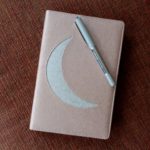 She isn’t going anywhere. There is no cure. I need to mother her and myself.
She isn’t going anywhere. There is no cure. I need to mother her and myself.
I put a pen in her hand and gave her a pink notebook so she won’t hide. Can’t I agree to ask her every day? “How are you? Where do you hurt?” Can’t I agree to listen every day and accept that even though some pain never goes away, it helps to be heard?
***
Do you have childhood scars that never go away? Do they disappear a while before resurfacing or do you just stop noticing they’re there? For other articles about my dad, see When Dads Die Young. For another article about my mother and the healing that arrived before her death, see A Mother’s Blessing.
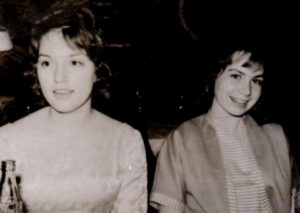
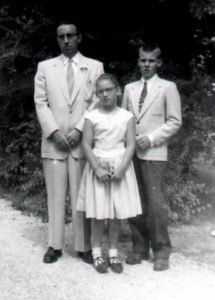
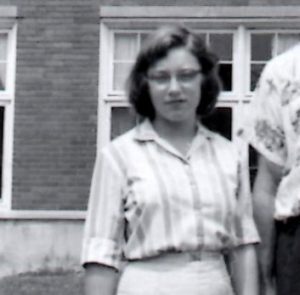
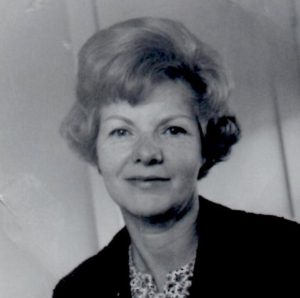

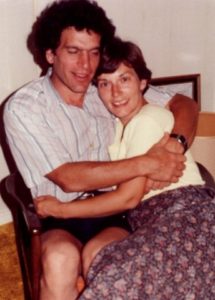
What a difficult experience that must have been.
Lydia, I think the worst part was the emotional isolation. So many of us have had similar experiences. In the 1950s, this is what people thought they should do. Shut up and get on with it. When my mom got Alzheimer’s nearly 40 years later, her grief about my dad came pouring out. It hadn’t gone anywhere in all those years, but it had cut her off from her feelings and her children.
You say, “My grief was ignored. That’s not the worst thing.” But what if it is . . . ?
Still, it helps to be heard. I am listening to your voice and I HEAR what you are feeling. Like you, in my chilhood I learned the lesson from the What Not To Do parent department: Buck up, Be Strong, Don’t Let Them See You Cry.” That’s shogwash and we know it. Our inner child needs nurturing as long as we live.
Thank you for this “memoir”insight. In a current draft of my own WIP are these words: “In Yoga tradition, one Sanskrit word for early impression (or scar) is spelled samSCARa. Scars admit the existence of wounds, wounds that time and experience can begin to heal. From soul scar can come wisdom. And great healing of the spirit.” i wonder what you think of those words, Elaine.
I recall reading “A Mother’s Blessing” and can see the photo of your mother, her eyes reaching out to you, connecting. Moments to cherish!
“
I hear you, Marian. Thank you. And I’m grateful no one abused me or tried to hurt me. This wasn’t an uncommon way to deal with grief in those years. It did lots of quiet damage to many families. Yes, we know it’s hogwash now.
I know the word samskara well. I loved studying Hinduism when I first started looking into world philosophies and Jung around 1970. I was taught that samskaras were the innate tendencies that remain from the past (or past lives) and pattern our actions in the present. I like your changed spelling. These traits and tendencies (good and bad) become teachers for the soul. We learn to deepen the pattern or leave it behind. (I can’t wait to read your memoir!!)
I wrote in the comment below that when my mother developed Alzheimer’s in her 80s, all that grief came pouring out with tears and longing for my dad. Her last years were hard, but brought a chance for deep soul healing between us. I forgave her many times over–and then again after Vic died and I realized how little support or guidance she had in dealing with being a widow at 44 who had been a caregiver for 12 years.
Dear Elaine, I love the way you write with your open heart and tear in your eye. For such honest, steadfast grace invites the reader to meet that lonely, heart-broken girl within. The wafer-thin one who lived in a dark, silent house. I trust you can feel the love and warmth as others hearts and eyes settle on her. We love her, we care for her, as we would with any forgotten child … for not one must be left on the shelf!
After being abandoned, in lots of ways as a young girl, the hurt and suffering crushed her spirit and it’s taken the rest of her life to recover … and yet, I’m weeping as I write because I didn’t how I saved myself until I read your words, “I put a pen in her hand and gave her a pink notebook so she won’t hide.” Beautiful, beyond words! Thank you so much for sharing your profound insight … what a gift your heart is to the world!
Do you have childhood scars that never go away? Yes, many. Do they disappear a while before resurfacing or do you just stop noticing they’re there? Yes, given the right weather conditions. In those dark times I turn to my poems, my words and see that your words, and others loving words, are there on the screen … and I know that my own hungry, sweet child has been fed and that, “Food Was Never the Problem.” In sisterhood and in soul, Deborah.
Deborah, your wounded child has had a pink notebook in her hand for a long time. I read your poetry nearly every night still. Recently, as the 10th anniversary of Vic’s death approaches, I find myself returning to the poem “Wait for Me.” What a comfort it is. (Deborah’s book of poetry for those who read comments is ‘A Liberated Sheep in a Post Shepherd World’ by Deborah Gregory. Highly recommended!)
I know something of your scars from reading your poetry. Yes, food was never the problem. Just an old-fashioned symptom. I haven’t read your latest blog because I had a surprise visit from a precious friend who lives 3000 miles away. She came to see her brother who was in a medical crisis. He stepped back from the brink and we were able to spend a few days together. It was a wonderful way to feed the hungry child. Thank you, dear sister and wise poet.
Thank you so much my dear friend for the love, light and laughter you guide across the oceans between us. I’m delighted that you spent many a happy hour with your precious friend and feed your little girl! I didn’t say (because I can ramble on!) I loved seeing more of your family photos, they add such warmth, depth and richness to your beautiful, brave words. Especially for you, and for all the lovers out there …
Wait For Me
One of us
will have to go first.
If it’s you,
wait for me.
So we can spend
the last moment together,
before our wings unfold
and we enter Eternity.
Thank you, dear Deborah. May I share your poem on my Facebook page with full attribution to you and details about your book. I planted the first seeds in my garden today about a month past the usual date. What joy! And then there were the pesky bugs. We forget about them when it’s cold, but there are many here this year.
Yes, that would be lovely Elaine! Although I’m not on FB myself, my partner is, so I do get to see your wonderful posts. On a separate note, I’ve been rereading your heart-breaking yet soul-making book “Leaning into Love” these past few days. Oh my Goddess! It’s shaking my heart! Beautifully penned, beyond words! You inspire me to write reams of poetry! The first being an ode to that little mouse (P.13)! Love and light, Deborah.
I posted your poem on my Facebook author page today with a photo I took a few years ago of geese flying through beautiful evening clouds. https://www.facebook.com/authorelainemansfield/ There are a few nice comments already.
Thank you for loving my words just as I love your words. Yes, the mouse story. As I said in the book, Vic would have loved the comic relief. Everyone was laughing except the mouse and the horrified funeral director. We’ll both keep writing and sending our hearts out to life.
Thank you for this. It touched me deeply.
It’s so timely that I read this today, Elaine, as I have been writing in my private journal about ways I abandoned myself during my early adulthood and through my first marriage. I do have scars that resurface. What a brave piece you’ve written – sharing your childhood pain. I will start asking my younger self how she’s doing. Such a simple question full of love.
Molly, I wrote a first draft in a writing class. When I read it out loud, I felt a huge amount of shame swirling around the sort of loss many of us endure in silence. Me being me, the shame made me uncomfortable, but also curious to explore more, so I worked on this piece and shared it widely (nervous about that all the way). It is a simple question, but I have to discipline myself to ask it. Day before yesterday, I hadn’t done my morning writing but found myself asking her while driving to town. I had to pull over because I felt so emotional when that inner voice grabbed for my reassurance and was grateful when I gave it. So much packed into a simple inner conversation that came from asking, “How are you? Do you hurt today?”
‘…it helps to be heard’ – even if only by ourselves. When those painful feelings arise, or some sense of undifferentiated discontent, my first ‘reaction’ is to raid the fridge or whatever else is at hand. I sometimes know I’m hungry for something that it is not a physical hunger for food. Sometimes not –
Thanks Elaine for this powerful post. It calls attention to paying careful attention to any wounding of mine from times past, which can get triggered by an unkind or thoughtless comment from somebody, who has no connection to the original dynamic. When I reflect on it later, I realise the need to mother myself and show myself compassion and thereby to the original ‘dynamic’.
Thank you, Susan. There are so many ways to mother ourselves–I have to remind myself each time I’m unhappy and head for the kitchen–and many don’t involve actual eating. I can nurture my soul by sniffing magnolia flowers (now in full bloom after having snow three mornings ago) and peeking at bluebird eggs. Often when I’m caught in emotional eating, I try to talk myself out of it in a rational way. The nutritionist in me wants to sort this behavior out. It rarely goes well. That little voice stomps her feet and says, “You don’t love me. You just want to shut me up.” Her wrath and neediness don’t go away, but I’m doing my best to remember and engage.
I love you Elaine. I love you for your feelings, for what you write, for your truth telling, for helping me feel through your writing, for bring my friend through the hard times. I am crying now reading your words. Thank you!! THIS IS ANOTHER GORGEOUS PIECE. You inspire me.
MUCH LOVE TO YOU AND 14 ELAINE. and all the other Elain’e too
Oh dear Lori, you know. Thank you for big beautiful words and for sharing your tears and feelings. What a comfort it is for me to have a friend who hears me and has shared similar hard losses. Much love to you, too, Lori–all of you in all your tender honesty and caring,in laughter and in tears.
Do I have childhood scars that never go away.? Yes. You and I have at least one in common. My father died when I was 11. My response was to be stoic like my mother, ignore my pain, shut down my feelings and voice, and bite my fingernails until they bled. When I was 27 and had a spiritual crisis, I realized there was something wrong with my ability to feel my real feelings but I had no idea how to gain access to them. At 37 I had another spiritual crisis and all the disowned hurt, pain, anger, sorrow and rage began to spew out like lava. At 47 I finally began to study Jungian psychology and write, and that’s when my healing began. But I know it would never have happened it I hadn’t consciously lived with the pain for a full ten years. That just seems to be the way with feelings. They want out, one way or another, and as we’ve both learned, identifying them, giving them names, seeing them in our dreams, writing, and active imagination are very effective ways to send them packing. Not that they’ll ever be gone for good by any means, but once we’ve given them our full attention, they do eventually tend to ease up and hang around for shorter periods of time. Thanks for the beautiful writing and necessary reminders.
We do have this in common, Jeanie. Early death of our fathers and moms who didn’t want to feel themselves or us. It was a relief to begin talking about grief with my mother when she was elderly and losing her memory. Her grief and tears about my dad and about memory loss helped me forgive everything–but didn’t make the suffering girl disappear. I think of her as an inner Persephone figure who demands I listen to her feelings even when I want to ignore them. (Was Demeter interested in Persephone’s feelings? I wonder.) This inner girl insists on a daily relationship, not just one when we’re in crisis. That’s my goal. Ask her everyday how she is. Sometimes she’s fine. Sometimes not. Right now, we’re trying to figure out what makes her happy other than eating sweets. A few days ago, she said a puppy would make her happy. Oh no. Am I ready for a second dog? We shall see.
This is such a moving article, dear Elaine.
I am so sorry you had to do through all this. A process of denial. A way to escape your own feelings. But… haven´t we all been there?… I know I could identify with your story. And I am not talking about losing someone so important as your dad. And yet, your post resonates with me: “I was hungry for sweetness but starving for perfection”. That is a powerful statement for me as well…
You say: “I understood long ago that my mother did the best she could”…. And… yes, I agree with you… sometimes people just can´t face tough things… so they create ways to dispel the attention from those issues. I am not sure is the best thing. But it can “save” some people… from falling down into a dark depression, for instance. Moving forward can be sometimes just running away from something, if you know what I mean.
I am glad you could find closure with Vic.
Thank you for sharing your experiences with us. <3 Love & best wishes to you, always!
Yes, I know we’ve all been there. I felt ashamed when I wrote the first draft because people suffer awful things and my suffering was so ordinary, but it felt important to let this part of myself speak and share the experience. I like to remind grievers of what becomes obvious in time–we don’t get over it, but we carry our scars forward into life. They’re our teachers. I think of the Rumi quote: “The wound is the place where the light enters you.”
I understood what my mother had suffered as I got older. She had no support and didn’t know there was any value in doing anything other than developing a tough persona. Our culture is better attuned to helping a 44 year old widow with children now, but not then. People felt the kindest thing was to not mention the loss for fear they’d make the griever weep. My mom needed to weep, but was afraid she’d fall apart. By the time my husband died, I knew it was healthy and normal to grieve. Thank you for taking time to read and comment, Aquileana. With love and gratitude.
Thank you for this post, Elaine.
And yes, as Rumi knew … “The wound is the place where the light enters you.”
I love that quote, Ashen. I ended my TEDx talk “Good Grief! What I Learned from Loss” with it and made my one flub in a 17 minute talk without notes. The poem was on the screen behind me attributed to Rumi, but when I spoke it facing the audience and not the screen, I said the lines were by Rilke (another favorite poet). I didn’t catch my mistake and most people didn’t, including the producers, but a close friend did. With a TEDx talk, there is no re-doing, so I asked the editors to please include the screen shot of the quote so people who noticed would know that I’d made a mistake and didn’t think the quote was from Rilke. Our poor floundering egos. I could only laugh as I messed up the easiest part with a quote I knew so well.
Powerful post Elaine. So sadly, I could relate to a lot of it, as you know. We both lost our nurturing fathers young too. I don’t think we ever forget. I was particularly focused on this part Elaine – “I didn’t want anyone to ask how I was doing. It was easier to hide. My fragile defensive shell would have been easy to crack. I only needed someone to ask, “How are you?” Emotional neglect was a silent abuse.
Yes, I agree. From what I know, your mom was much more toxic than mine in her cluelessness, Debby. My mom was abandoning, but not mean. I never doubted she loved me in her detached way. She was driven to make her own life work after my dad’s death and made the false assumption that I could take care of mine. I agree that emotional neglect is a silent abuse.
<3
Thank you, Elaine, for your searching, digging, pondering, sharing … and faithfulness to your 14yr old self. I resonate with
…..Shame rises from my belly and floods my face. Am I talking about this again? Still? I’ve explored this in a hundred ways since the 1960s, but the wounded girl in me refuses to die….
Your precious words are so helpful. I am wrestling with what it was to have a brother born when I was 9 mths old and then as the eldest of 10 to have 5 siblings die at birth, with that old ‘bury it’mechanism for my parents in the late 40’s, and 50’s. Thank you for the comfort of your word ‘still’ and the gentle understanding that “The wound is the place where the light enters you.”
How nice to receive your comment, Catherine. Maybe shame is the price of having a human ego that tries to fit into society and family. So many of us are burdened by it, and it’s not easy to talk about. It’s hard to imagine what it would be like for you as a child to live in a household where the potential for life in your mom’s pregnancies resulted in 50% death. And no one spoke to you about the emotional price being paid. There was no space or cultural interest in grief then. I agree this is how things were handled in the late 40s and 50s–I was born in 1945. My dad’s illness was a taboo subject except with my mom and my uncle (Dad’s brother), but the kids were “protected” and his illness was hidden until it became very obviouis. I figured it out by the time I was 10 or so, but the atmosphere of fear had always been there. As kids, we/you felt all the grief and fear without being allowed to speak or ask questions.
Yes, I agree, and feel so much of what you and your readers say. I love the way you put the depths of the psyche out there, for us, for you. Do any of us escape scars from childhood? How could we when we live in a culture that refuses to see the reality of how the soul grows, how pain must be faced in order for us to grow strong, or maybe just to grow up at all. How failure and success, life and death are so fused? No one in my family would talk about death, so it became even more of a concern.
Thanks for your kind words, Ira. Sometimes what is most personal is most universal because, I agree, none of us escape childhood without wounds. So much about this culture shuts us down as kids and on. Death was taboo in my world, too. As I got older, a few important people in my world were honest about their dying process and grief. It didn’t take me long to realize that was the best path. If we shared our wounds, we’d have more compassion toward each other. You’re so good at writing about that.
Lovely. Powerful. Gripping. And so very relatable. I too have an untethered 14 year old in me, eager to be heard. I’ve listened to and nurtured the younger ones over four years time, from infancy to adolescence. Then I stopped.
I was fortunate. In the early 90s, when I most needed nurturing, left hand right hand journaling was “in.” I took to it in the dry sponge seeking water fashion I did so much of back then. I journaled in that fashion daily for four years. It is powerful. It taps other parts of the brain.
Thank you for giving voice again (and again) to the power of leaning into love. How lucky Vic was to find you. (Yes, I meant it that way).
I’m glad you were given those tools, Janet (and as I write the word “given,” I smile at your last name). I began my inner search at around 22 because my husband, a friend, and I went into a new bookstore in Ithaca. I wasn’t looking for anything in particular. We didn’t know we had just stepped into a new life where we would study Jung, learn how to meditate (sort of–I still feel like a novice), and study and discuss philosophical texts from ancient and modern writers. Our teacher was a serious student and quester who had left NY City to raise his family in a more rural area.
I have only tried L hand R hand journaling a few times. I love knowing it was so effective for you. I’ve practiced Active Imagination for years which puts that less known part of ourselves in dialogue with ego consciousness. It’s been a powerful tool for me. Tears come to my eyes at your last paragraph, Janet. Vic would agree with you. One of the good things about being with him is how often he expressed that. I’m still amazed at our good fortune as our 50th wedding anniversary comes this month. I’m still carrying all that love.
My mother is still alive (she was 92 this week) so I have never felt able to express the pain and terror I felt as a child. I now recognise this as depression. One day I will explain what it was like growing up with a Mum who didn’t really know how to love her daughters, something I blame, not on her, but on her own difficult childhood. When I do eventually write down my feelings, I doubt they could be as expressive, comforting or revealing as these, Elaine.
Thank you for your supportive words, Marilyn. I was so embarrassed to post this piece, but I know so many of us share these wounded corners–sometimes from outright horror and sometimes more subtle. I’m glad you recognize the part of yourself that received inadequate love. I hope you’ll give her a voice. I know, too, that my mother was only passing along what she’d been taught. I can’t imagine her life. A husband off to war for 4 years when she was in her 20s, returning sick from WWII, and then caregiving for years until his death when she was 44. She was done taking care of anyone. I imagine you can write your feelings well, Marilyn. If you excuse me passing on something I read recently, just start writing the stories that still hold deep feeling and emotion. The words and feelings will be there.
The gift is your honesty and the sharing of your spirit, as it was in your book. I am so blessed to have met you and to feel your presence when I read your writing. You know enough about grief to nurture your young self with your love. I see her too. Much love, Therese
Thank you, Therese. I’m glad we met in person as well as in books. I hope we see each other again. Yes, I know how to nurture my wounded inner girl, but need to remember to turn my attention to her rather than abandoning her. Many of us need reminders to turn what we know into loving action for ourselves and for the world. With gratitude for you and all you offer others.
Your post is a profound opening for me to look inside. Years ago while having dinner with friends, almost every time I participated in the conversation my friend would say, “I’m sorry but I just want to say…”. About the fourth time this occurred and my friend turned the conversation back to me I lost it and said, “thanks but I think I’ll just stop trying to speak.”
Later in the parking lot she came over and apologized for interrupting, telling me she gets so excited to share etc. I told her that her interruptions made me feel invisible/unimportant/not worthy . There was genuine shock on her face. She never realized what I might be feeling outside of annoyance perhaps.
Reading your article makes me realized just how invisible I have been and how I, on the other hand, have attempted to draw attention to myself in many ways.
My father was in a terrible accident when I was 15. He lived but was hospitalized for 6 mths and then at home recouping for 6 more months. Beginning the day after the accident my mother began to fill me in on how much she hated him, all the things that he did that were selfish…I’d had no idea. I shared this with my older brother who told me Dad was an alcoholic and a gambler. I didn’t know this either. I told my best friend… and she knew, her family all knew and our mutual friends knew.
Ignored? Invisible? It’s a fine line, is it not? Your post has made me decide I need to share my words with myself. I bought a journal today.
Dear Mary,
I’m glad this post brought up memories you needed to consider. I know it’s painful to explore these things, but also freeing. I need to look 10 times when something small remains a thorn or irritation but keeps showing up in my thoughts or feelings. Even if it’s seemingly small, there’s a message there for me. Sounds like that’s true for you.
Your mother’s “confidences” sound inappropriate and painful. How could you hold such information as a girl watching your dad suffer? And then to learn he wasn’t who you thought he was. It sounds so painful. Yes, it’s a fine line between ignored and invisible. I wasn’t ignored as long as I found ways to shine with good grades or taking part in school musicals, but my feelings and grief were ignored. This became invisible, even to me. I didn’t know until I was an adult and began exploring my wounds with the help of many teachers and books. I’m glad you bought a journal. Sharing your words with yourself and facing where you are is the beginning of change. I also go to a therapist 1-2 times a month. We’ve been working together since before my husband’s death (every week then), so it’s another opportunity to check in with myself and dig down tinto how I truly feel. Sometimes hurt. Sometimes angry. Sometimes invisible (especially now that I’ve become profoundly although not completely deaf). When I keep digging, I find compassion for myself.
I’m so glad this post was helpful to you.
“I put a pen in her hand and gave her a pink notebook so she won’t hide. Can’t I agree to ask her every day? “How are you? Where do you hurt?” thank you for this essay and these 2 lines in particular. My little girl hides too, and I have to remember to ask her to come be with me, to ask her how she’s doing. We used a pink pen sometimes 🙂 We all have a child inside that needs to be loved… thank you for reminding me. And mine says hello to yours and sends a hug.
Hi Adult Debra and Little Debra. Thanks for your loving comment. It’s hard to remember to take care of this part of myself rather than scolding her for not growing up or being more tougher. It’s a work in progress and never finished, it seems. I let the little girl in me have her way and have a new puppy as a result. She’ll be a big dog but she’s affectionate and loves to snuggle. The little girl in me needed that more than I knew–and also the closeness that comes from training an animal companion. Thank you for the hug. I send one back with a puppy lick.